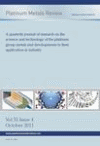-
oa Recovery of Palladium from Spent Activated Carbon-Supported Palladium Catalysts
- Source: Platinum Metals Review, Volume 57, Issue 4, Oct 2013, p. 289 - 296
Abstract
Activated carbon-supported palladium catalysts are liable to progressive deactivation even in the absence of any gaseous contaminants during the oxidation of hydrogen under ambient conditions. The high value of palladium coupled with environmental considerations means that new, efficient and cost effective methods for the quantitative recovery of palladium from such materials are required. In the present study, a process for extracting precious metals from spent catalyst or inorganic waste was developed. Palladium was extracted from the spent catalyst with an acid solution containing dilute hydrochloric acid and hydrogen peroxide at leaching temperatures of around 90°C. Palladium in the leached solution was then precipitated by use of sodium borohydride solution. The effectiveness of the method for recovery of precipitated palladium was investigated by ultraviolet-visible (UV-vis) spectrophotometry, X-ray diffraction (XRD) and scanning electron microscopy (SEM). The recovered metallic palladium was of a suf cient grade to manufacture fresh activated carbon-supported palladium catalysts.


